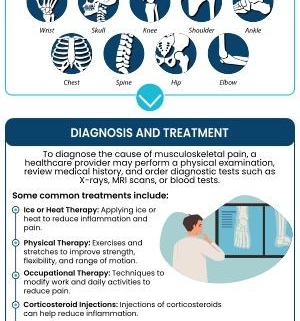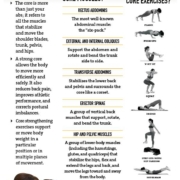5 Effective Strategies for Managing MSK Pain and Mental Health
In the intricate tapestry of our well-being,musculoskeletal (MSK) pain adn mental health often intertwine,creating a complex challenge that many face daily.Whether it’s the persistent ache in your back or the weight of stress and anxiety, these issues can significantly impact your quality of life. In this listicle,we will explore five effective strategies designed to help you manage both MSK pain and mental health concerns. from practical exercises to mindfulness techniques,each strategy aims to empower you with tools that foster resilience and promote holistic healing. By the end of this journey, you can expect to gain valuable insights and actionable tips that will not only alleviate discomfort but also nurture your mental well-being. Let’s dive in and discover a path toward a healthier, more balanced life.
1) Embrace Mindfulness Practices: Engaging in mindfulness techniques such as meditation,deep breathing,or yoga can help reduce stress and anxiety,which are often exacerbated by musculoskeletal pain. By focusing on the present moment, individuals can cultivate a sense of calm and improve their overall mental resilience
Incorporating mindfulness practices into your daily routine can be a transformative approach to managing both musculoskeletal pain and mental health.Techniques such as meditation, deep breathing, and yoga not only promote relaxation but also enhance your awareness of bodily sensations.By taking a few moments each day to engage in these practices, you can create a mental space that allows you to observe your pain without judgment, helping to reduce its emotional impact. This shift in viewpoint can foster a greater sense of control over your body and mind, paving the way for improved well-being.
To get started, consider dedicating a few minutes each day to a mindfulness practice. Here are some effective techniques to explore:
- Guided Meditation: Use apps or online resources to find guided sessions tailored to pain management.
- Breathing Exercises: Practice deep, diaphragmatic breathing to activate the body’s relaxation response.
- Gentle Yoga: Incorporate poses that focus on stretching and strengthening muscles while promoting relaxation.
For those new to mindfulness, tracking your progress can be beneficial. The following table summarizes some simple mindfulness activities along with their potential benefits:
| Mindfulness Activity | Benefits |
|---|---|
| 5-Minute Meditation | Reduces anxiety and enhances focus |
| deep Breathing | Promotes relaxation and decreases heart rate |
| Gentle Yoga | Improves flexibility and alleviates tension |
2) Develop a Balanced Exercise Routine: regular physical activity tailored to individual capabilities can enhance both physical and mental well-being. low-impact exercises like swimming, walking, or tai chi can strengthen muscles and joints while releasing endorphins that boost mood and alleviate pain
Creating a personalized exercise routine can significantly impact your physical and mental health, especially for those managing musculoskeletal pain. Focus on low-impact exercises that cater to your individual needs and limitations. Activities such as swimming, walking, and tai chi not only help strengthen muscles and joints but also provide a gentle way to stay active. These exercises engage your body without placing excessive strain on it, making them ideal for pain management. Additionally, they promote flexibility and balance, which are crucial for maintaining mobility and preventing further injuries.
Engaging in regular physical activity can also trigger the release of endorphins,the body’s natural mood lifters. This biochemical response can help alleviate feelings of anxiety and depression often associated with chronic pain conditions. To help you get started, consider the following tips for developing a balanced exercise routine:
- Set realistic goals: Aim for small, achievable milestones to build confidence.
- Listen to your body: Pay attention to how your body responds to different exercises and adjust accordingly.
- Incorporate variety: Mix different types of activities to keep your routine enjoyable and engaging.
- Stay consistent: Aim for at least 150 minutes of moderate exercise each week,broken down into manageable sessions.
| Exercise Type | Benefits |
|---|---|
| Swimming | Low-impact, full-body workout that improves endurance and flexibility. |
| Walking | Easy to incorporate into daily life, boosts cardiovascular health. |
| Tai Chi | Enhances balance,reduces stress,and promotes mindfulness. |
3) Foster Social Connections: Building a support network of friends, family, or support groups can provide emotional relief and practical advice for managing MSK pain. Sharing experiences and coping strategies with others can foster a sense of belonging and reduce feelings of isolation
Connecting with others who understand the challenges of managing musculoskeletal (MSK) pain can be incredibly beneficial. Whether it’s through friends, family, or dedicated support groups, these relationships can provide a safe space to share your experiences and feelings. Engaging in conversations with those who have similar struggles can lead to invaluable insights and coping strategies. Consider reaching out to local community centers, healthcare providers, or online platforms to find groups that resonate with you. Sharing your story not only helps you process your own pain but also allows you to support others, creating a reciprocal relationship that fosters emotional growth.
Additionally, consider the power of social activities that can distract from pain and enhance your mood. Here are some ways to strengthen your social connections:
- Join a local or online support group focused on MSK pain.
- Participate in group activities like yoga, art classes, or walking clubs.
- Schedule regular catch-ups with friends or family, even if it’s a virtual coffee date.
- Volunteer for community events to meet new people and engage in fulfilling activities.
These connections not only provide emotional relief but also create a sense of belonging that can significantly improve your mental health. By surrounding yourself with a supportive network, you can navigate the complexities of MSK pain with greater resilience.
4) Prioritize Sleep Hygiene: Quality sleep is crucial for both physical recovery and mental clarity.Establishing a calming bedtime routine, creating a comfortable sleep environment, and addressing sleep disorders can significantly improve pain management and emotional health
Quality sleep is essential for anyone dealing with musculoskeletal pain and mental health challenges. Establishing a calming bedtime routine can signal to your body that it’s time to unwind. Consider incorporating activities such as reading a book, meditating, or gentle stretching to help ease tension and prepare your mind for rest. Additionally, be mindful of your sleep environment; a dark, quiet room with a comfortable mattress and pillows can make all the difference in achieving restorative sleep.
Addressing any sleep disorders is equally critically important. Conditions like insomnia or sleep apnea can exacerbate pain and emotional distress, making it crucial to seek professional help if you suspect you have a sleep issue. Keeping a sleep diary can also be beneficial; it allows you to track patterns and identify factors that may be disrupting your sleep. Here’s a quick reference table to help you implement effective sleep hygiene practices:
| Practice | Description |
|---|---|
| Consistent Sleep schedule | Go to bed and wake up simultaneously occurring every day. |
| Comfortable Environment | keep your bedroom cool, dark, and quiet. |
| Limit Screen Time | Avoid screens at least an hour before bed. |
| Relaxation Techniques | Practice deep breathing or meditation to calm your mind. |
5) Seek Professional Guidance: Collaborating with healthcare providers, such as physical therapists, psychologists, or pain specialists, can lead to a comprehensive approach to managing MSK pain and mental health. Tailored treatment plans that address both physical and emotional aspects can empower individuals to take control of their well-being
Collaborating with healthcare providers is a pivotal step in managing musculoskeletal (MSK) pain and mental health. By engaging professionals such as physical therapists, psychologists, and pain specialists, individuals can receive a holistic treatment plan tailored to their unique needs. These experts can assess the interplay between physical discomfort and emotional distress, helping to uncover underlying issues and develop strategies that address both.This comprehensive approach not only alleviates pain but also fosters resilience and emotional well-being.
Incorporating a multidisciplinary team into your care can lead to notable improvements in quality of life. Here are some benefits of professional guidance:
- Personalized Treatment Plans: Customized strategies that consider individual challenges.
- Integrated Care: Coordination among various specialists ensures all aspects of health are addressed.
- Continuous Support: Regular check-ins and adjustments to the treatment plan based on progress.
- Empowerment: Gaining knowledge and tools to manage symptoms effectively.
To illustrate the potential impact of a collaborative approach, consider the following table highlighting the roles of different healthcare providers:
| Provider Type | Focus Area | potential Benefits |
|---|---|---|
| Physical Therapist | Movement and rehabilitation | Improved mobility and pain reduction |
| Psychologist | Mental health and coping strategies | Enhanced emotional resilience |
| Pain Specialist | Chronic pain management | Targeted interventions for pain relief |
To Conclude
navigating the complexities of musculoskeletal pain and mental health can be a challenging journey, but it’s one that can be managed with the right strategies. By incorporating these five effective approaches into your daily routine, you can foster a holistic sense of well-being that addresses both the physical and emotional aspects of your experience. Remember, it’s not just about alleviating pain; it’s about nurturing your overall health and finding balance in your life. Whether it’s through mindful movement, supportive therapies, or cultivating a strong support network, each step you take can lead to a brighter, more empowered tomorrow. Embrace these strategies,and take charge of your health journey—your body and mind will thank you.









Leave a Reply
Want to join the discussion?Feel free to contribute!